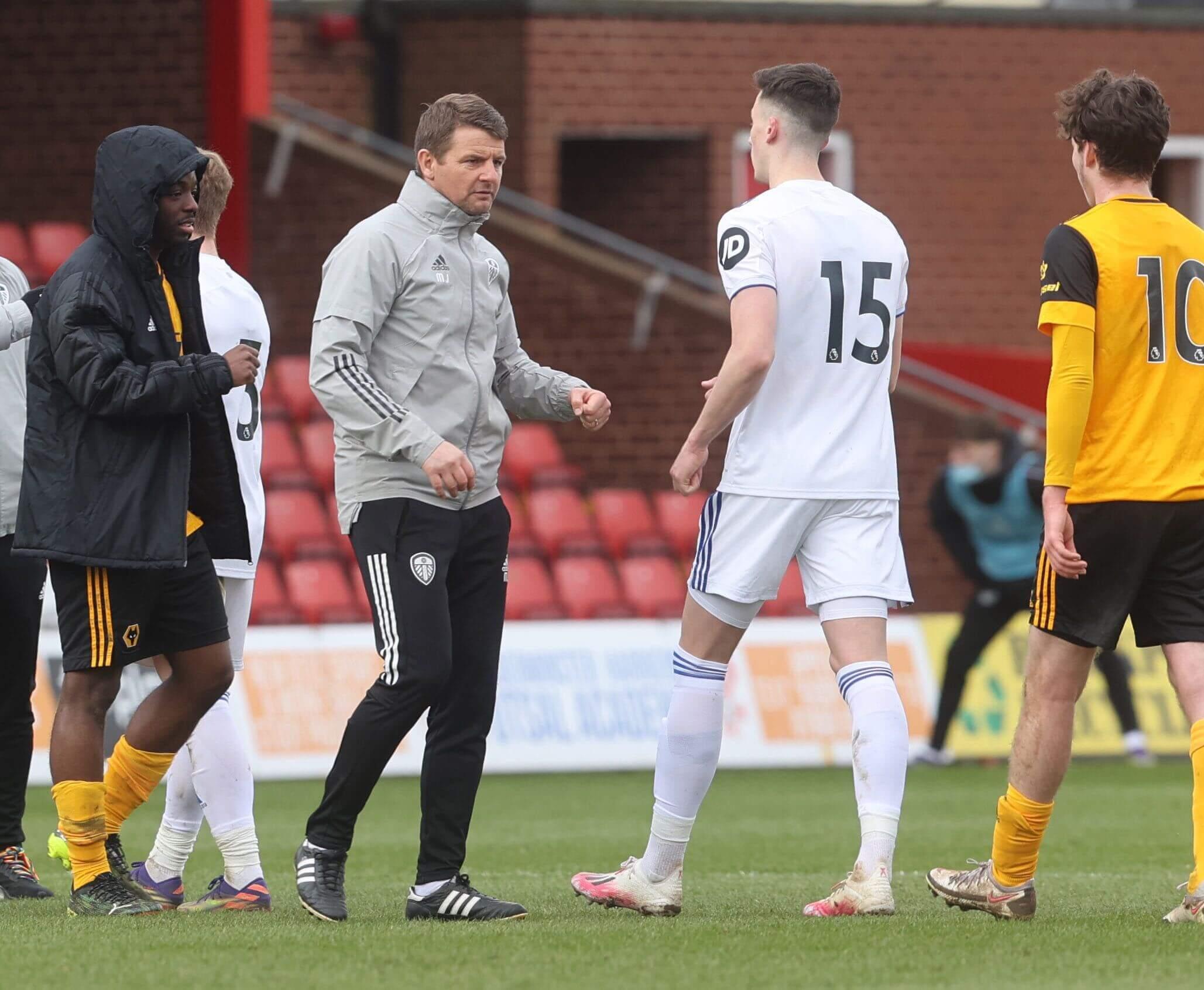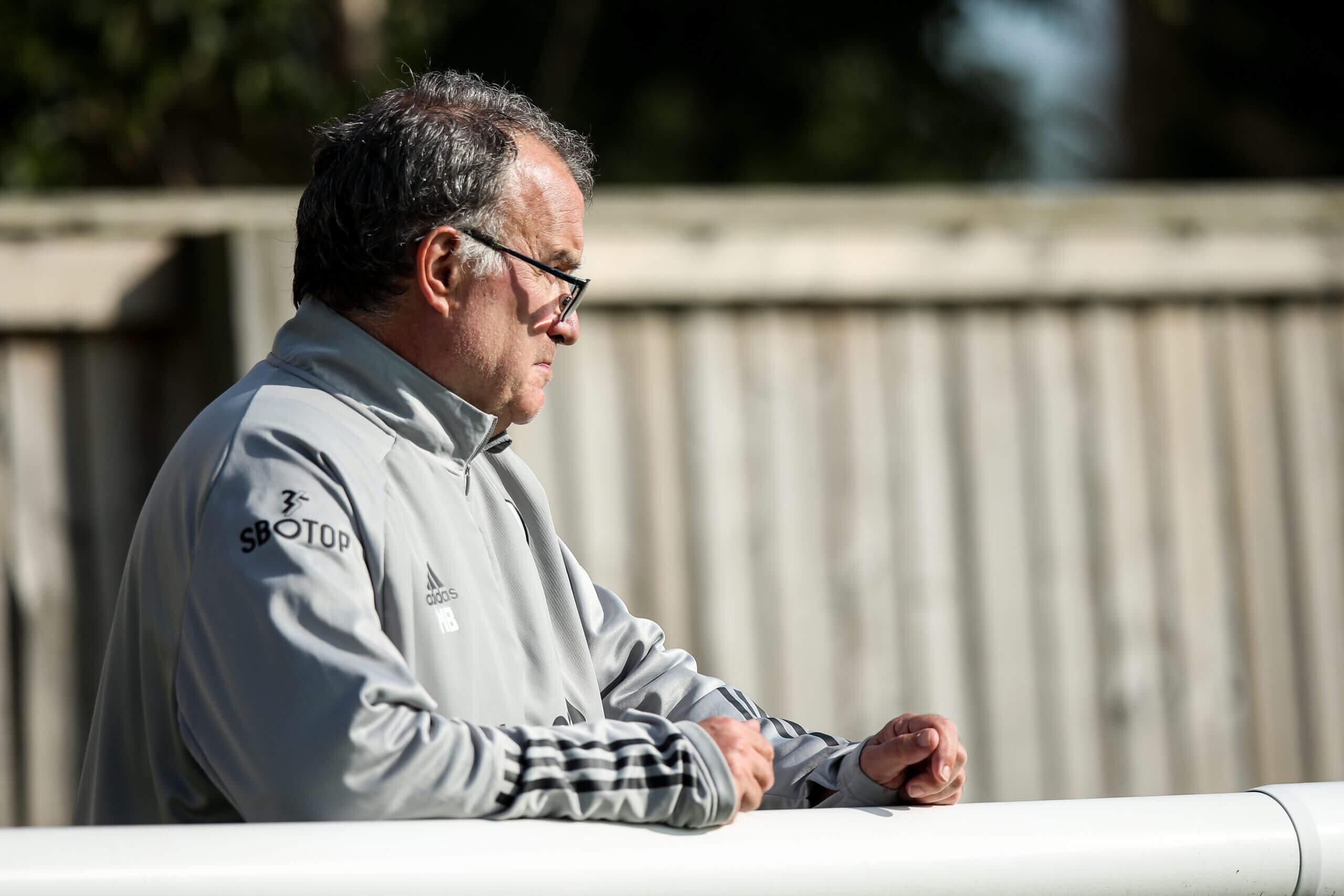Leeds U23 coach Mark Jackson: 4am analysis and getting guard of honour from Bielsa’s first team

On the short walk out to training each morning, Mark Jackson likes to remind whoever is with him that all of them are living the dream. This isn’t work, he often says. Coaching for a top-level academy in a setting as picturesque as Leeds United’s training ground — try to find the downside.
As he tells me this, his mobile rings. It’s a call from Scott Gardner, a youth-team coach at Leeds, telling Jackson how the club’s under-17s got on in a game at Loughborough. The downside of management? Well, you could say that the treadmill never stops. “No, it doesn’t,” Jackson says. “But you know what? I wouldn’t want it any other way. It’s how I’m wired at the minute. Once you’re in, you’re in.”
Last Friday, in Jackson’s first season as Leeds’ under-23s boss, his team won Premier League 2’s Division Two title. When he got home from a 2-1 victory at Aston Villa, he sat up until 4am with footage of the game, analysing the performance. It was not enough to say that the league was done or to ditch the replays for one night. His squad had two games to go and the first team’s season was a month and a half from finishing too. The last thing Jackson wanted Marcelo Bielsa to see was him switching off or phoning it in.
“I learned that as a player,” Jackson says. “Football immerses you, totally immerses you, and that’s even more true when you’re a coach. There’s always something to look at or think about. You’re always trying to find… well, not fault as such but things that weren’t so good. Sometimes when the game’s going on you get embroiled in the emotion of it and you miss things. I was buzzing when I got home but I got a cup of tea and stayed up until four watching it. I feel better knowing I’ve done that.”
When Leeds promoted Jackson from the under-18s job to the role of development squad coach in September, he inherited a thriving squad and a prime position. Two years of close contact with Bielsa’s first team had invigorated the under-23s and Jackson was filling big shoes left by his predecessor, Carlos Corberan. But this season, and despite their promotion to a higher division last summer, the under-23s have been almost untouchable. There are very close parallels between the way Bielsa’s side play and the way the development team set up and as a result of the tactics clicking so well, the youngsters looked like they were on a different plane. They were too good for the rest of the league.
“This isn’t me being big-headed about the boys but nearly every team have come off after playing us and said it’s the hardest game they’ve had,” Jackson says. “The Aston Villa manager said to me that we were as intense as he’d seen.” That win wrapped up the title and on Saturday morning, when Jackson and his players arrived at Thorp Arch to train again, they were given a guard of honour on the indoor pitch by Bielsa’s senior squad.
“It was a little bit emotional, the respect they were showing us,” Jackson says. “We really appreciated it. Us staff, we didn’t want to walk through it because this season’s been all about the players but everyone insisted that we did. It typifies where we are as a club, I think. It feels like everything’s right, like we’re all in it with each other from top to bottom.”
Corberan left Leeds in July to become manager of Huddersfield Town. He had been with Leeds for three years and, for two of those, occupied a role that spanned both the first team and the under-23s. The development squad’s style of play had changed under him and changed for the better, even before Bielsa arrived. Replacing him was a major call, a switch that had to be seamless in maintaining the productive link that Bielsa sought between the two groups.
Bielsa thought at first about asking one of his assistants, Pablo Quiroga or Diego Reyes, to plug the gap but Jackson was a strong alternative. He had been in the academy since 2015 and made a positive impression on the club’s under-18s, many of whom had since moved into the group above. Jackson received a call from Leeds’ academy manager, Adam Underwood, shortly after managing a very young under-23s side in the EFL trophy at Accrington Stanley. That game ended in a 7-0 defeat and Jackson feared that bad news was coming.
“Adam asked if we could have a chat and I have to be honest, I was a bit worried,” Jackson says. “We’d just been beaten 7-0 at Accrington but the first thing he said to me was, ‘Don’t worry, this is positive’. I wasn’t putting pressure on myself. I was content with the 18s but when we spoke about the 23s, it just felt right. I knew some of the group already and I knew what we were planning to recruit. I thought it would be the right step.”

Jackson at one of Leeds Under-23s’ games earlier this season (Photo: Leeds United)
Underwood had tried to create a network of staff that meant coaches, like players, had the ability to move through the age groups when vacancies came up. But it was a big decision, not least because of the attention Bielsa paid to how the academy functioned and performed. Jackson was an academy defender at Leeds in the 1990s and spent five years in the senior squad before leaving for Scunthorpe United in 2000. “This is the most I’ve ever seen a manager want to be part of the whole club,” he says. “Him and his staff, they’re so intuitive.”
“It’s remarkable,” Underwood says. “You’ve got a head coach who has huge short-term pressures, to make sure the first team are performing at a very high level, but he still finds time to pull me into his office to chat about the best under-18s team for a training session. He’ll ask about the under-15s or -16s and sometimes I’ll think, ‘I’m not sure I’ve ever even mentioned that player to you but somehow you already know about him’. There’s no divide here between academy and first team, not like you see at some clubs.
“With Mark, he’s been incredibly patient and willing to earn his stripes as a coach. He was ready for the step up and his ability to level with players and create a connection with them has been a real strength. There are lots of wonderful coaches out there. There aren’t so many, in my opinion, who can blend that talent with understanding your environment and connecting with the players. That’s the knack and Mark’s got it.”
Earning stripes almost understates the route Jackson has taken. When he started taking an interest in coaching, he told himself to think of nothing as beneath him. He worked with Farsley in non-League and at Leeds City College. When he joined Leeds in 2015, on the invitation of Leeds’ then academy head Paul Hart, he sacrificed other jobs and effectively took a pay cut.
“It was a gamble from a personal point of view,” he says. “A financial gamble. I had a job at Leeds City College and one at Farsley. I was doing the under-14s at Bradford. These things contributed to me being able to pay my mortgage and look after my family but I’ve never been motivated by money. Joining Leeds was the right time to take the jump and to properly concentrate on one thing.
“In my playing days, there was a point where coaching didn’t really appeal. It didn’t feel like it would be for me. But when I started to dip my toe in, I loved the idea of helping players improve and seeing their progress. When anyone asks me for advice, I tell them to coach as many people as possible. Some of my mates, they finished playing and went straight in with an academy youth team. I’ve coached in primary schools, college, non-League, soccer camps, all age groups down to five- and six-year-olds. It was all really good for me. I never wanted to get ahead of myself.”
From the start of Bielsa’s reign, the under-23s have been a pillar of his project at Leeds. They mix regularly in first-team training sessions and increasingly, the different squads are like one group rather than two. They are held to the same standards and physical targets. All of the under-23s’ games and training drills are filmed for analysis, providing compact footage of individual players. Bielsa wants the under-23s to be prepped and ready to jump into his match-day squad whenever he calls on them. He also looks for Jackson to integrate senior players into under-23s matches, to sharpen their fitness and give them minutes.
“I’ve seen a massive increase in analysis,” Jackson says. “I thought it was detailed when I first came here but it was nothing like this. This manager, his detail, and his attention to it are phenomenal. The analysis has increased tenfold and it’s a massive tool. It’s intense but it’s very much needed. It’s the best way to identify strengths and weaknesses. The individual stuff is crucial.”

Bielsa is famed for his attention to detail (Photo: Robbie Jay Barratt – AMA/Getty Images)
Bielsa said recently, and apologetically, that his insistence on having seniors in the development side complicated Jackson’s job; that it denied Jackson the chance to have complete control over line-ups and tactics. “That scenario is not the ideal one,” Bielsa said. “The coach has to adapt his plans depending on the needs of the first team. Their coach and players have contributed in a very valuable way.”
Jackson sees the blend of old and young professionals as an advantage. “With regards to making it harder for me, not at all,” he says. “I don’t see that. I think the set-up we’ve got works best.
“I used to play for the old reserve team at Leeds so I’m used to this. There was an agreement at the start of the year that if senior players needed minutes, Marcelo had scope to influence that and put them in. But he gave me the freedom to coach the team and pick the rest of it and that was very important for me.
“The benefit we have is the attitude of the senior lads. I speak to other under-23s coaches and sometimes they’re not totally happy when first-teamers drop down. It can be seen as disruptive and maybe their attitudes aren’t great. But 100 per cent, every player who drops down here, their attitude is first class. I found myself saying that all the time in interviews after games because it was true and I felt like I needed to make the point.
“Even with the analysis, I’d see someone like Pablo Hernandez in the front row for the sessions before a 23s game, concentrating and listening to what’s being said. Ultimately, we’re there to make sure the players are ready for Marcelo’s team, whether it’s fitness or the young boys getting exposure. We know our role.
“The important thing is that even when big-name players drop down, the 23s have to make it clear that, ‘Hang on a second, we’re competitive in our own right’. It’s not just a case of going through the motions and letting the senior players make the difference. Utopia for me is you have a group who demand everything from each other. And we’re in a good place.”
Jackson says the reasons why the under-23s have been so dominant in their league are numerous. For one thing, Bielsa’s tactics — a handful for full-blown Premier League and Championship teams — are rare and exceptional at academy level. The recruitment of juniors has been highly effective, too, and Leeds possess a core of players who have been at Thorp Arch for years. Some of them featured under Jackson when the under-18s won their league title in 2018 with a victory over Bolton on the last day of the season. “I actually showed (current Leeds youngsters) Olly Casey and Charlie Cresswell that game again before we played Villa last week,” Jackson says. “I wanted to remind them of what it was like to get it done.”
There is a leadership group in his dressing room, mirroring the small collective Leeds have at first-team level. When the club want to address issues with Bielsa’s squad, like last year’s COVID-19 wage deferral, discussions take place with Liam Cooper, Stuart Dallas, Luke Ayling and a handful of others. Jackson made the same arrangement with the under-23s and suggested creating a leadership group for the under-18s as well.
“The lads don’t want to hear me waffle on all the time,” he says. “If there’s something specific to transmit, I can use the leadership group to do that. Likewise, if there’s something they want to get across to me but maybe not individually, the leadership group can do it collectively. They’ve got that tool and that voice. One of the things I wanted the players to feel was that they’d have a voice if they needed one.
“If you understand each other better, you work better. It was like that this week. I gave them Monday and Tuesday off after winning the league but I had to call them into a team meeting first. Charlie Cresswell said to me, ‘What’s this about?’, and I basically told him it was a way of me sleeping soundly for the next two nights. Relax mentally, have a bit of fun but do the right things and don’t do anything which causes a problem. Because we’ve still got two games left and the first team have plenty in front of them too. Don’t forget to look after yourselves.”
Not all of this season has been a cakewalk. Jackson’s side got a shock at Newcastle in November where they led 3-0 after 31 minutes but lost 4-3 in stoppage time. Bielsa got in touch with him straight after the final whistle, via Bielsa’s translator Andres Clavijo, and asked to pass on a message to the squad. “Andres gave me a call and asked if it was OK for Marcelo to send a text,” Jackson says. “I thought that was quite funny. He doesn’t have to ask my permission for anything.
“The message said, ‘These things happen in football. What’s important is that you learn from it’. That was brilliant for the group, honestly fantastic to hear when you’re trying to get your head around a result like that. We went on a really good run after that. The manager and his staff, they have got such a vested interest in the academy. For all of us, we’re in an environment with one of the best coaches in the world. Who wouldn’t want that?”
Underwood, who has been with Leeds for 12 years, says the academy is in “the best health it’s ever been in”. The Premier League awarded it category one status last year and next season, Jackson’s squad will mix with the best of the best: the Manchester clubs, Liverpool and Chelsea. At the same time as competing with them, they have the perennial job of preparing and nurturing the under-23s for the day when Bielsa lets them loose in the Premier League. Several of the development team look like they are made for that level but Jackson can see why Bielsa has not been tempted to blood many of them this season.
“The gap is massive,” he says. “It’s not that these boys aren’t talented or can’t get there but you have to be sensible. It’s not only about jumping to the first team but sustaining yourself there when you do. As coaches, you can’t narrow the gap. What you can do is accelerate the progress of the players and we work on giving the manager a headache by saying ‘Listen, we think this player might be ready for you’. But he’ll blood them when the time’s right.”
The cycle is never-ending. Leeds will recruit again this summer, for their first team and the academy. Jackson’s players will redouble their efforts to try and cross the bridge between them. And Jackson will continue with his 4am analysis sessions, a cup of tea in hand.
“What’s happening here with the manager aligning philosophies, I think it will be with the club for years to come,” he says. “But you can’t stand still. If you want to do this, you don’t just dip a toe in. There’s no point. If you want to get better you go in with two feet. Fully committed.”

 14
14 